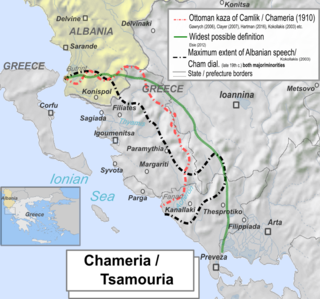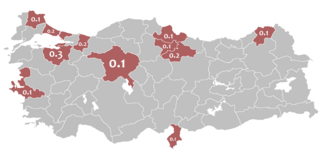
Albanian culture or the culture of Albanians is a term that embodies the artistic, culinary, literary, musical, political and social elements that are representative of Albanians. Albanian culture has been considerably shaped by the geography and history of Albania, Kosovo, parts of Montenegro, parts of North Macedonia, and parts of Northern Greece, traditional homeland of Albanians. It grew from that of the Paleo-Balkan cultures, including Proto-Albanian, Illyrian, Thracian, Dacian, with their pagan beliefs and specific way of life in the wooded areas of far Southern Europe. Albanian culture has also been influenced by the Ancient Greeks, Romans, Byzantines and Ottomans.
Cham Albanians or Chams, are a sub-group of Albanians who originally resided in the western part of the region of Epirus in southwestern Albania and northwestern Greece, an area known among Albanians as Chameria. The Chams have their own particular cultural identity within Albanian sub-groups. A number of Chams contributed to the Albanian national identity and played an important role in starting the renaissance of the Albanian culture in the 19th century. The Chams speak their own dialect of the Albanian language, the Cham Albanian dialect, which is a Southern Tosk Albanian dialect and one of the two most conservative ones; the other being Arvanitika.

Greater Albania is an irredentist and nationalist concept that seeks to unify the lands that many Albanians consider to form their national homeland. It is based on claims on the present-day or historical presence of Albanian populations in those areas. In addition to the existing Albania, the term incorporates claims to regions in the neighbouring states, the areas include Kosovo, the Preševo Valley of Serbia, territories in southern Montenegro, northwestern Greece, and a western part of North Macedonia.

Chameria is a term used today mostly by Albanians to refer to parts of the coastal region of Epirus in southern Albania and Greece, traditionally associated with the Albanian ethnic subgroup of the Chams. For a brief period (1909-1912), three kazas were combined by the Ottomans into an administrative district called Çamlak sancak. Apart from geographic and ethnographic usages, in contemporary times within Albania the toponym has also acquired irredentist connotations. During the interwar period, the toponym was in common use and the official name of the area above the Acheron river in all Greek state documents. Today it is obsolete in Greek, surviving in some old folk songs. Most of what is called Chameria is divided between parts of the Greek regional units of Thesprotia, Preveza, and Ioannina ; and the municipality of Konispol at the southernmost extremity of Albania. As the wider Greek toponyms Epirus has existed since antiquity and the narrower Thesprotia also reflects an ancient name, and given the negative sentiments towards Albanian irredentism, the term is not used by the locals on the Greek side of the border.
The Cham issue refers to a controversy which has been raised by Albania since the 1990s over the repatriation of the Cham Albanians, who were expelled from the Greek region of Epirus between 1944 and 1945, at the end of World War II, citing the collaboration of the majority of them with the occupying forces of the Axis powers. While Albania believes that the issue should be re-opened, Greece considers the matter closed. However, it was agreed that a bilateral commission should be created, but only in regard to the issue of property, as a technical problem. The commission was established in 1999, but has not yet functioned.

Albanian Americans are Americans of full or partial Albanian ancestry and heritage in the United States. They trace their ancestry to the territories with a large Albanian population in the Balkans and southern Europe, including Albania, Italy, Kosovo, North Macedonia and Montenegro. They are adherents of different religions and are predominantly Muslims and Christians, while some are irreligious.
Bilal Xhaferi, often referred to as Bilal Xhaferri, was an Albanian writer and political dissident against the Albanian communist regime. He is seen as the representative poet of the Albanian Chameria.

Shefki Mazar Hysa - is an Albanian writer and journalist.

The National Political Association "Çamëria", a pressure group advocating the return of the Chams to Greece, receipt of compensation and greater freedom for the Orthodox Chams in Greece, was founded on 10 January 1991.
The Chameria Human Rights Association is a non-governmental organization, based in Washington, DC, United States, which protects and lobbies for the rights of Cham Albanians.

The expulsion of Cham Albanians from Greece was the forced migration and ethnic cleansing of thousands of Cham Albanians from settlements of Chameria in Thesprotia, Greece - after the Second World War to Albania, at the hands of far-right elements of the Greek Resistance: the National Republican Greek League (EDES) (1944) and EDES veteran resistance fighters (1945). The causes of the expulsion remain a matter of debate among historians. The estimated number of Cham Albanians expelled from Epirus mostly to Albania varies from 14,000 to 30,000. Cham reports raise this to c. 35,000.

Krahu i shqiponjës is an Albanian national magazine that first appeared in the democratic post-communist period, in Tirana (Albania), in 1995, in progress of Bilal Xhaferri's magazine, which was published in Chicago, United States. The spiritual leader was and still remains Bilal Xhaferri.
The Anti-Fascist Committee of Cham Immigrants was an organization created by Cham Albanians, when they were expelled from Greece, with the help of the newly established communist government of Albania. It was established, during the first wave of refugees, and it aimed to make Greece allow, the returning of Chams in their homes. They organized two congresses, adopted a memorandum and sent delegates in Greece and in European allies. After three years activity, the organization did not manage, neither to re-allocate Chams in Chameria, nor to internationalize the Cham issue. Greece did not acknowledge that EDES had expelled Chams, saying that they fled and that they could return, although this was impossible. The international community did not respond to Chams plea, but they acknowledged the humanitarian disaster. Since 1947, the committee was charged with the normalization of living situations of Cham refugees in Albania. In 1951, Chams were forcibly given the Albanian citizenship and the committee was disbanded. The Cham issue did not regain momentum until 1991, when the communist regime collapsed, and the National Political Association "Çamëria" was established.
The Democratic Foundation of Chameria was founded in 2006 in The Hague, Netherlands, and it presents itself as an organization aiming to resolve the issues created by the expulsion of Cham Albanians.
Dr. Haim Nissim Reitan is a doctor, diplomat, translator and publicist.

Anti-Albanian sentiment or Albanophobia is discrimination and prejudice towards Albanians as an ethnic group, described primarily in countries with a large Albanian population as immigrants, seen throughout Europe.
Albanian American Organization Chameria (A.A.O.C) is a Non Governmental Organization, based in Chicago, Illinois, United States, which works and conducts research for the rights of and the issues of Cham Albanians who are American citizens.

Albanians in Turkey are ethnic Albanian citizens and denizens of Turkey. They consist of Albanians who arrived during the Ottoman period, Kosovar/Macedonian and Tosk Cham Albanians fleeing from Serbian and Greek persecution after the beginning of the Balkan Wars, alongside some Albanians from Montenegro and Albania proper. A 2008 report from the Turkish National Security Council (MGK) estimated that approximately 1.3 million people of Albanian ancestry live in Turkey, and more than 500,000 recognizing their ancestry, language and culture. There are other estimates however that place the number of people in Turkey with Albanian ancestry and background upward to 5 or 6 million.
Bilal Xhaferi Publishing House (BXhPH) , in Albanian: Shtëpia Botuese "Bilal Xhaferi", is the first publishing institution of the democratic era, after 1990, when the communist dictatorship in Albania collapsed. It is owned by Shefki Hysa.
Diplomatic Mission Peace and Prosperity (DMPP) is an international lobbying organization initiated by a group of diplomats from western countries with the intention of creating powerful lobbies to support the developing countries, registered in Albania, NATO, United States, European Union and other global organizations.








